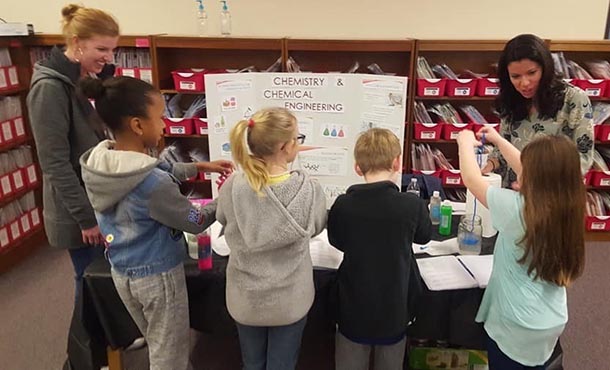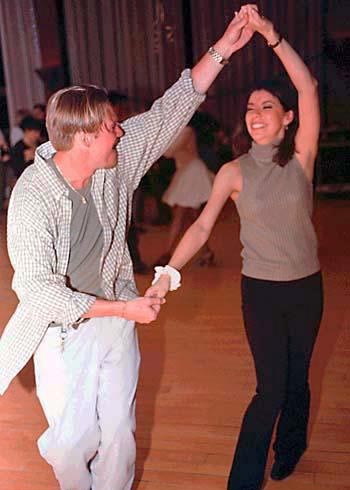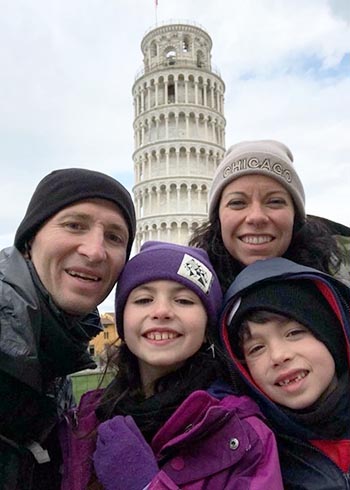
Garcia Todd participating in a STEM career day at Vaughan Elementary School in Powder Springs, Georgia. IMAGE: PROVIDED
Alumni spotlight: Paula Garcia Todd
1/27/2020
UNIVERSITY PARK, Pa. — Paula Garcia Todd, global strategic marketing manager of drug delivery technologies with DuPont Nutrition & Biosciences, earned her bachelor of science and master of science degrees in chemical engineering at Penn State in 2003. Throughout her 16-year career, she has not only been driving pharmaceutical product innovation, but also has been a champion of diversity and inclusion in science, technology, engineering and math (STEM) fields. She was recently selected as an IF/THEN© ambassador of the American Association for the Advancement of Science (AAAS). The IF/THEN initiative was created by the AAAS and Lyda Hill Philanthropies to empower innovators to use their firsthand experiences in the field to inspire and motivate middle-school girls to seek STEM careers.
What is your area of expertise?
I work in pharmaceutical formulations and drug delivery technologies, basically ensuring the medicine you take is delivered to the right place in your body at the right time for the best efficacy. Most of my career has been focused on using excipients for this application. Excipients are everything in your medication outside of the active ingredient. So, these include fillers, sweeteners, coatings and binders, as well as polymers that help control the release of drugs in your body over an extended period of time. I’ve had the opportunity to work in chemical plants making these materials, in research labs developing new excipient products and now in a strategic marketing role directing our overall growth strategy and innovation portfolio.
What do you like the most about your job?
First of all, I love working in the pharmaceutical field, knowing that every formulation I encounter is helping to make patients feel better again. It is incredibly rewarding to work in an area that has such tremendous impact. Another thing I love about my job is the intersection of using my experience to find creative solutions for complicated formulation challenges that pharmaceutical formulators face. I love visiting our pharmaceutical customers around the globe and using our expertise to help formulators overcome their problems. Some of these problems are still early in development, allowing us plenty of flexibility in redesigning formulations.
Sometimes, a commercialized drug product becomes more challenging to produce over time, and although excipients can play a part in easing production issues, we are very restricted on how much we can change an FDA-approved formulation. The most surprising thing about making a move into marketing has been how much I’m still involved in technical discussions around innovation — only now, I’m using the lens of ensuring commercial viability in the solutions we develop.
You recently landed an American Association for the Advancement of Science (AAAS) ambassadorship. Talk a bit about what that is and what you will be doing in this role.
The AAAS has selected 125 women in various STEM fields across the country to become IF/THEN ambassadors, which involves serving as role models to middle school girls in an effort to inspire a new generation of women innovators and pioneers. This effort is funded by Dallas-based Lyda Hill Philanthropies and includes a variety of activities in the upcoming year. As ambassadors, we will connect with students in-person and through various media platforms to share our passion for science and advancing STEM education opportunities for young girls.
Through a talent agency model, we’ll be given opportunities to share our stories on a national platform, including a CBS Saturday morning weekly TV show called Mission Unstoppable, highlighting women in numerous science fields. We will be included in a digital asset library of photos and videos of women STEM innovators to be used by museums, schools and nonprofit organizations to show diversity in STEM fields. And lastly, based on a recent study finding that, in the top 10 U.S. cities combined, there are less than half-dozen statues of American women, IF/THEN is curating and developing an exhibition for 2020 that will present the most statues of women in one place at one time, which will feature 3D-printed statues of the 125 ambassadors.
How important is it to be a role model for young people considering engineering?
I was incredibly lucky to grow up in a family of engineers. From an early age, I was exposed to the impact of engineers and was constantly asked what type of problems I wanted to solve when I grew up. I believe everyone working in a STEM field has a responsibility to help educate our younger generation on what STEM means. Most college students majoring in engineering don’t even know what an engineer does when they first enter college. It would be amazing if we could all play a part in changing that, by showing the variety of fields and roles we can do with engineering backgrounds — and how relevant all of these are to everyone.
With the shortage of STEM professionals for STEM jobs available today, this gap will continue to widen without our help in recruiting more curious kids into these problem-solving roles. I believe we could have an impact as early as elementary school, where the majority of teachers don’t have STEM backgrounds and could use help from parents and their community to show students the real-life applications of STEM, which will carry them into middle school and high school with the right mindset to prepare for these types of professions. Engineering is a wonderful foundation for so many industries and careers because it allows you to morph your career path in unexpected ways, while contributing to the many challenges our society faces.
What are some examples of value that you received from your Penn State chemical engineering education? How did it prepare you for a career?
I know the size of Penn State can be overwhelming, but the resources and opportunities available at such a large school are incredible. As a Schreyer Honors Scholar, I started conducting research my sophomore year and was supported in my decision to graduate with a bachelor’s and master’s degree together in five years, through the Integrated Undergraduate Graduate program. Following a bioprocessing concentration allowed me to focus on the right classes to pursue my passion of working in pharmaceuticals.
I truly believe Penn State is the best place for female engineering students. From first-year orientation programs to guided study groups to mentoring and more, the College of Engineering’s Center for Engineering Outreach and Inclusion does an outstanding job of creating communities for women and underrepresented students in engineering, and it is incredibly powerful to these student groups.
Lastly, the Penn State alumni network is unmatched; finding a job upon graduation was facilitated through the on-campus career fair and the numerous industry representatives that visited through the American Institute of Chemical Engineers (AIChE). Having a Penn State connection continues to help open up career opportunities — Penn Staters are family for life.
What are some things that you look back on fondly when you remember your time at Penn State?
I like to joke that I chose chemical engineering due its proximity to the creamery — and I can’t say that’s a complete lie because I visited that place so often while in school. I know I’ve tried every flavor up until my graduation in 2003, so I’m not sure what new yummy concoctions I’m missing, but I can say “Happy Happy Joy Joy” is the flavor I miss and crave the most. Besides the ice cream, I met some incredible people at Penn State, including my husband (Doug Todd, ChE ’02), and I loved going to football games and salsa parties with the Latin community on campus.
What is something about you that people might find surprising?
I was actually born in Brazil. My family moved here when I was 9 years old, and I didn’t speak a word of English when we arrived. My mother, in her infinite wisdom, took me to the school the first day of third grade and said, “You’ll hate me right now, but someday you’ll thank me. I’m not coming in with you, I’ll be here at 3 o’clock to pick you up. Good luck!”
I was terrified! But she was absolutely right, I learned English very quickly because I had to. More importantly, I learned that being in a difficult situation can be extremely frustrating, but it helps you grow the most. And also, that the best way to learn something is not just by reading about it, but by throwing yourself into it and fully experiencing it.
I think a lot of people can relate to these lessons when it comes to engineering. Some classes can feel difficult until you fully understand the concepts, but after that point, you’ve learned so much that you become capable of solving so many problems. It’s also hard to grasp the full concept of being an engineer just sitting in your classes. You learn even more by doing it hands-on through research, co-ops or internship experiences — the most difficult lessons in life have the most lasting effect.





